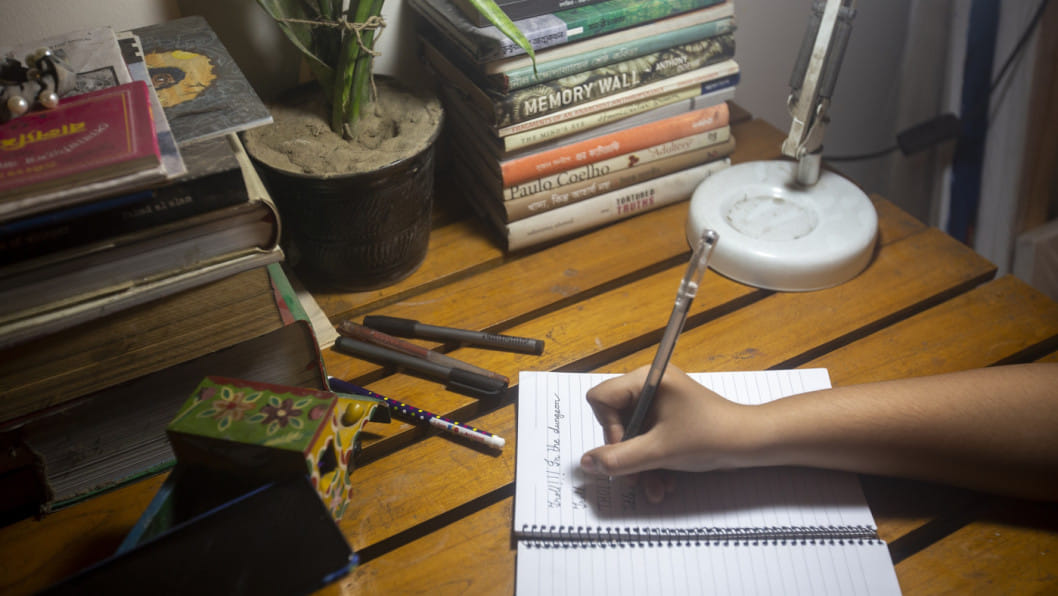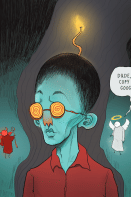The ghosts who write our assignments

I've done my fair share of exploitative content writing gigs for the bare minimum before I landed a freelance contributing writer position at SHOUT. There are indeed some shady things that go on in the world of content writing, but I never really questioned them until I saw a post in a Facebook group for content writers.
The post read, "Need experienced tech writer for my thesis. Long term project." It was something along those lines.
In case you didn't know, a thesis is supposed to be an original research work that must be submitted for partial fulfilment of a degree like honours, master's, or a PhD. You can use the thesis for publication or as proof of research work when applying for higher education. But regardless of what you do with it, it is unethical and potentially dangerous to have it ghostwritten.
This incident made me look back at how much of a norm ghost writing practices are throughout our academic lives.
Ramisa Kareem*, studying at a reputed college in Dhaka, says, "I used to be horrible at art. My mom tried all sorts of drawing teachers and coaching centres, but we finally gave up. I had my home tutor draw my art homework. I'd just colour in the lines."
By the time we grew out of drawing assignments, it was time to write lab reports. The norm is to find a senior's lab notebook and force your sibling into copying it, cover to cover. This was and still is how thousands of lab reports get produced every year, especially for students in the national curriculum.
But did you know there are human photocopy machines at Nilkhet who'd get this done for less than nothing? In very neat handwriting as well.
Fast forward to a few years and we have university students who ghostwrite and avail ghostwriting services when it comes to term papers, essays, projects, thesis papers – you name it.
Afra Antara*, junior software engineer at a multinational company, says, "Back when I was looking for jobs, I found this remote job offer that was basically writing papers for college students. I've had juniors ask for my old projects back in university, but this was new to me."
Websites that give assignment writing services are not new. 123helpme.com, essaypro.com, and essayservice.com have been around for a while and a lot of Bangladeshi students contribute to these sites as freelance content writers. In recent years, this service has also been made available in Bangladesh in the form of Facebook pages, open to anyone looking for a decent essay and willing to pay for it. This practice also goes on under the table as most university students in Bangladesh have either made or received a request for assignment ghostwriting from either batch mates, seniors, or other university students.
Rudro Arafat*, a fourth-year university student says, "I have done a couple of projects for other university students. I mostly did it for my own learning, but a lot of people do it because it does earn you a quick buck. I do not consider this illegal as I am being paid for my labour. What's truly unethical is when seniors force us into doing their project/thesis work and give us no monetary compensation."

Arafat's classmate Sadia Nowshin* continues, "There was this one senior who acted all high and mighty, called us into his room saying he will help us learn things. He gave different people different parts to write, and, in the end, we found out that was his thesis that we ended up ghostwriting without getting anything in return."
The ethical ground in such dealings is murky, to say the least. Beyond ethics, the real problem lies in the quality of education students end up receiving. If we are meant to do these assignments for partial fulfilment of our degrees, isn't having it ghostwritten the same as having someone else take your exams for you? This becomes an even bigger issue in academia as ghostwritten papers often contribute to the existing body of knowledge.
When it comes to research, students alone cannot be blamed as they are part of a structure that allows these misconducts. A lot of university professors and independent researchers actively promote this by making their research assistants do all the work for research they take complete credit for. This can be dangerous as fellow academics who refer to such work in the future do so because they trust its supposed source.
Maya Tarannum*, a student pursuing her master's, shares, "Our university does not give enough research assistantship opportunities so I went out of my way to find a professor who will let me assist him in his research. I was very sincere with my work. I guess I was naïve in thinking I will be credited for my work."
It is partly our acceptance of such misconduct that is to blame for the creation of unethical researchers in academia who made headlines in 2021 and many more who go unnoticed because the system is too reluctant to take this seriously. The students who get their hard work stolen on the other hand are too scared of the power these so-called academics hold to really do anything about it.
Somewhere between joking about copied lab reports and gossiping about a senior/professor who has a history of stealing assignments, we grow up to wonder, isn't it time to question this shady rite of passage already?
*Names have been changed upon request for privacy.
Tazreen dreams of becoming a Himalayan hiker despite her inability to walk even 30 minutes a day. Expose your inner boomer by calling her a 'farm er murgi' at [email protected]

 For all latest news, follow The Daily Star's Google News channel.
For all latest news, follow The Daily Star's Google News channel. 









Comments